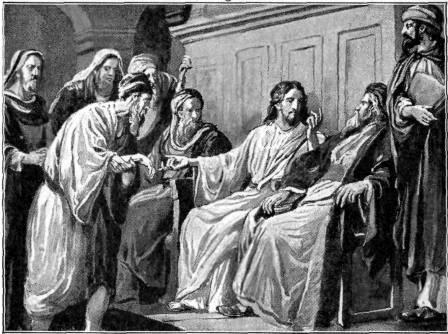The primary problem with theology is that it asks questions. This doesn’t sound like a problem, until you realize the danger of questions.
Don’t get me wrong, I love questions. I think everything should be questioned. But following the theme of Ecclesiastes 3, there is a time to ask questions, and there is a time to shut up and do actions.
Yesterday we looked at a famous theological question from the days of Jesus, and I suggested that Jesus hated the question, especially when the person that the debate was about was standing right in front of Jesus with a need that could be met.
When theology gets in the way of loving others, Jesus throws theology out the window.
But curiously, to make His point, Jesus begins by asking a question. I indicated previously that the reason Jesus asked the question is not because He didn’t know the answer, or because He thought His audience didn’t know the answer.
The reason Jesus asked the question is because He knew the answer, and He hated the answer.
By asking the question, Jesus is saying, “While you religious leaders come up with your theologically correct answer to determine whether or not you can heal on the Sabbath, here is a real, live human being who is hurting and in need of your help, and all you can do is sit there and debate about him like he was a log blocking the road.”
This incident is told in story form later with the parable of the Good Samaritan (Luke 10:25-37). There, theology kept some Jewish people from helping out a fellow Jew. But then Jesus shows a man who had theological (and cultural) reasons for not helping the wounded man, and helped him anyway.
The point is that when a person is in front of you who needs help, forget all your theology, and just help! They are people in need of help, not exhibits in a theological debate.
On this particular Sabbath in the Synagogue, Jesus wanted to show those who were gathered that they were being legalistic with the Sabbath. Rather than understanding the heart of God and using the Sabbath to love others, they were using the rules and regulations of the Sabbath to keep themselves from loving others.
The Sabbath was a day to show love to others, to do good to others, and that is what Jesus was trying to teach.

Now, the question is a bit removed from us today, because most of us don’t observe the Sabbath.
So let me bring it into real life for us. Here is what Jesus would do today:
He would show up in a church on a Sunday morning when a young woman visited who was 17, unmarried, without a job, pregnant, and considering an abortion. Jesus would stand up and say, “What do you think, should abortion be allowed or not?”
He would show up in a church on a Sunday when a homosexual couple visits the church, and Jesus would stand up and ask, “What do you think, should homosexuals be allowed to get married, or not?”
Jesus would show up in a church on a Sunday when a drug addict visits, and Jesus would ask, “What do you think, should the medicinal use of marijuana be legalized or not?”
Jesus would show up in a church when a family of illegal immigrants visits, and Jesus would stand up and ask, “What do you think, should illegal immigrants be granted citizenship or not?”
You see how this works?
Why would Jesus ask these questions? Not because He doesn’t know the answers. he does. Not because there are not right answers to these questions. There are. Not because these are not important questions. They are.
But on those Sunday mornings, when people are gathered to worship God, encourage each other, sing, pray, and study the Bible, there is one thing Jesus cares more about than the right answers to important questions. He cares about the pregnant teenager. He cares about the homosexual. He cares about the drug addict. He cares about the immigrant family.
Jesus cares about the person.
And that includes you and me.
Jesus cares about our hurts, our worries, our struggles. And He wants to see each and every one of us healed and be delivered from what has us in bondage. Whether we are that teenage girl, or that drug addict, or we struggle with pornography, or materialism and greed, lying, stealing, or overeating.
When someone else struggles with their marriage, or their job, or their kids, we tend to sit back and say, “Well, if they had just done this with their kids.” “Well, if they had just gone to that marriage conference and read this book, and if he would have been at home more, she wouldn’t have had that affair.”
But those are the questions and comments of Pharisees. They would rather talk and debate about such issues than actually help. It’s not that knowing the truth is wrong.
It is that debating the truth is wrong when it paralyzes us into inactivity.
The Pharisees, like too many of us today, got too caught up in the political and theological debates which focus on the issues, and completely ignored the people who were in need.
James 4:17 says, “Anyone who knows the good he ought to do, and doesn’t do it, sins.”
We think it reads, “Anyone who knows the good he ought to do, doesn’t have to do it if he can articulate his opinion, write letters to the editor and votes on election day.”
We think James 4:17 reads, “Anyone who knows the good he ought to do, doesn’t have to do it if he can defend his views to others, and write a check to local charity.”
No, James 4:17 says, “Anyone who knows the good he ought to do, and doesn’t do it, sins.”
It’s not enough to vote. It’s not enough to debate. It’s not enough to write out a check. These things are good, but Jesus would say, “They’re people! Help them!”
This post is based on the Grace Commentary for Luke 6:6-11.




Great post brother!
Thanks Drew!
Hey…check out this review by one of my favorite bloggers http://fireandrose.blogspot.com/2011/09/impossible-possibilities-on-christian.html
Drew,
That was a great review of the book. I read the book last month, and reviewed it here: https://redeeminggod.com/bible-made-impossible/
You’ve got this one right, Jeremy. Theology can sideline us from, caring about and for people. We can spend our time at church, blogging and elsewhere discussing theology and ignore the people next door and even in our own homes. I’ve even seen this happen to pastors and other “church leadership”.
If we’re not caring about, loving and engaging with those around us that is certain proof that our “theology” is worthless.
I fear I am guilty of this. I sometimes spend too much time blogging and thinking about theology….
We all tend to forget that what Jesus wants, what God wants is our heart. He wants it fully and unconditionally, and when he has it, we’ll do his will, theology be damned.
Steve,
Right. Of course, how do we know when God has all of our heart, unconditionally?
Good question.
Jesus couldn’t throw theology out the window, for He is Theos.
John,
You are right, of course, but His ultimate, guiding theological paradigm is that love for others is the ultimate way of living one’s theology. If theology doesn’t lead to loving others more, it is incorrect theology.